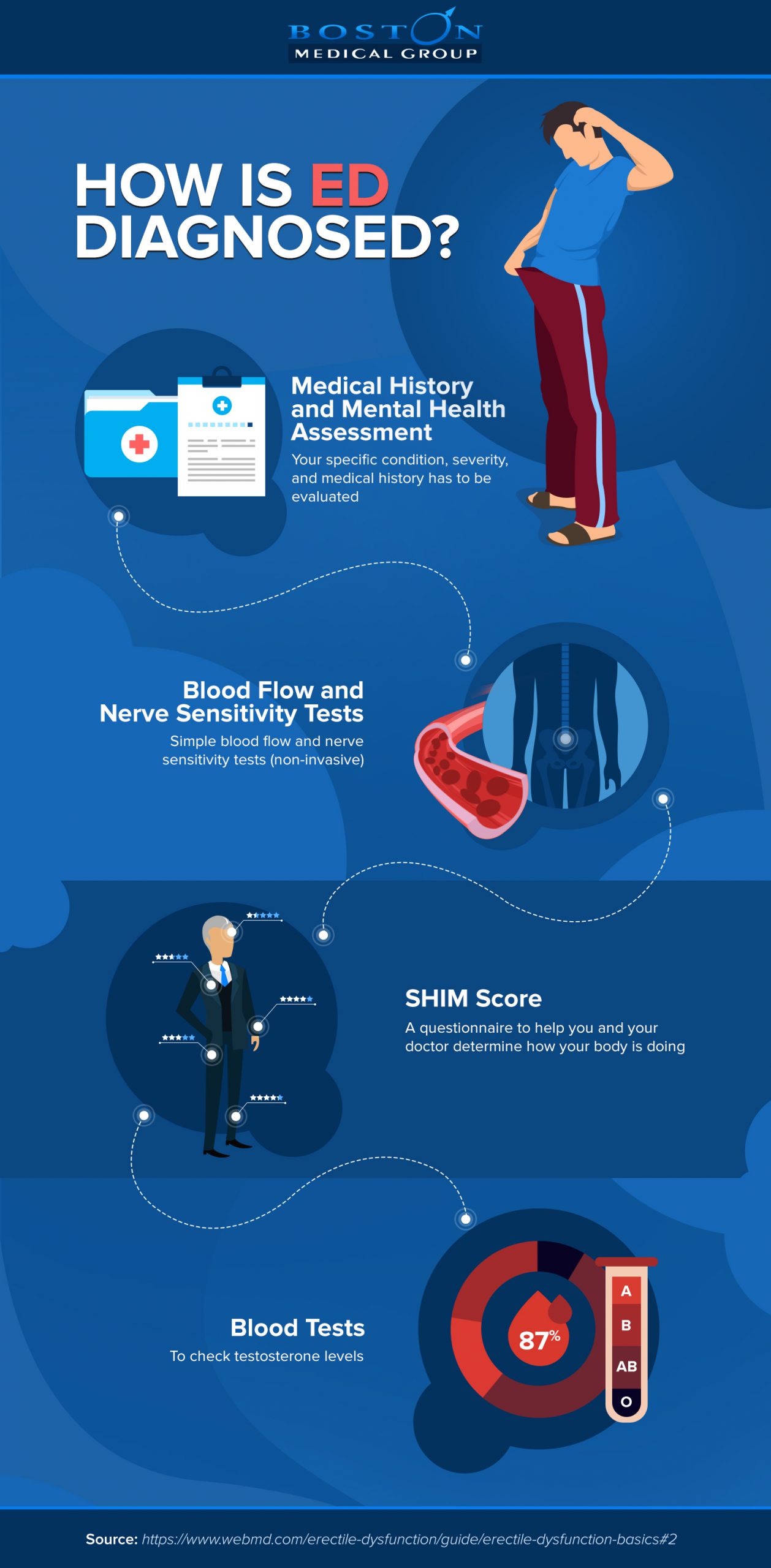ED is very common. Although most often seen in men over the age of 40, ED can affect men of all ages. But how do you know if you have it? How exactly is erectile dysfunction diagnosed?
You should consult with a board certified urologist who specializes in sexual performance issues. To diagnose erectile dysfunction, your specific condition, severity, and medical history should be evaluated first. Then simple blood flow and nerve sensitivity tests are conducted (all non-invasive) to determine the level of severity.
There is also available a SHIM score test to ‘grade’ your level of ED.
In cases of suspected low testosterone a simple blood test can also be conducted.

Erectile dysfunction (ED) diagnosis is a multi-step process involving a thorough medical history, physical examination, and various diagnostic tests. The goal is to determine the underlying cause of ED, which can be psychological, physical, or a combination of both.
Medical History and Physical Examination
The first step in diagnosing ED is a detailed medical history. The healthcare provider will ask questions about the following:
- Symptoms of erectile dysfunction: The frequency, duration, and severity of erectile difficulties.
- Medical Conditions: Chronic health conditions and illnesses like diabetes, hypertension, or cardiovascular disease (heart disease).
- Medications: Current prescription medication or medications that might contribute to ED.
- Lifestyle Factors: Smoking, alcohol consumption, and drug use.
- Psychological Factors: Psychological issues like stress, anxiety, depression, and relationship issues.
A physical examination follows, focusing on the cardiovascular, neurological, and genitourinary systems. This examination includes:
- Blood Pressure Measurement: High blood pressure can be a contributing factor.
- Genital Examination: To detect physical abnormalities like Peyronie’s disease.
- Neurological Assessment: To check for nerve damage or dysfunction.
- Cardiovascular Examination: To assess heart health and blood flow.
Diagnostic Tests
If the initial assessment suggests the need for further investigation, several diagnostic tests can be employed:
- Blood Tests:
- Hormone Levels: Measuring testosterone and other hormones.
- Blood Sugar Levels: To check for diabetes.
- Cholesterol Levels: High cholesterol can affect blood flow.
- Nocturnal Penile Tumescence (NPT) Test:
- This test monitors erections during sleep. Healthy men usually have several nocturnal erections or erections during sleep, indicating that the cause of ED might be psychological if nocturnal erections are present.
- Ultrasound (Doppler) Test:
- An ultrasound can assess blood flow to the penis. It involves injecting a substance into the penis that triggers an erection, then using ultrasound to see how well blood flows in and out of the penile arteries and blood vessels in the penis.
- Psychological Assessment:
- Questionnaires or interviews can help identify psychological or emotional issues and factors contributing to ED. This can include relationship issues, mental health conditions, or performance anxiety.
- Penile Biothesiometry:
- This test measures the sensitivity of the penis to vibrations, which can help identify nerve damage.
Diagnosing ED is a comprehensive process that involves understanding the patient’s medical history and sexual history, conducting a physical exam, and utilizing various diagnostic tests to pinpoint the cause. By accurately diagnosing the underlying issues, healthcare providers can develop an effective treatment plan tailored to the individual’s needs, addressing both the physical and psychological aspects of ED. This holistic approach ensures better outcomes and not only improved sex life but also quality of life overall for those affected by erectile dysfunction.
At BMG your visit will be completely private and confidential. You will consult with a MALE Doctor who is fully certified in this field of medicine. Expect a fast-moving, thorough 2-hour office visit and for 98% of men an immediate result can be achieved. Click here to book an appointment today.

